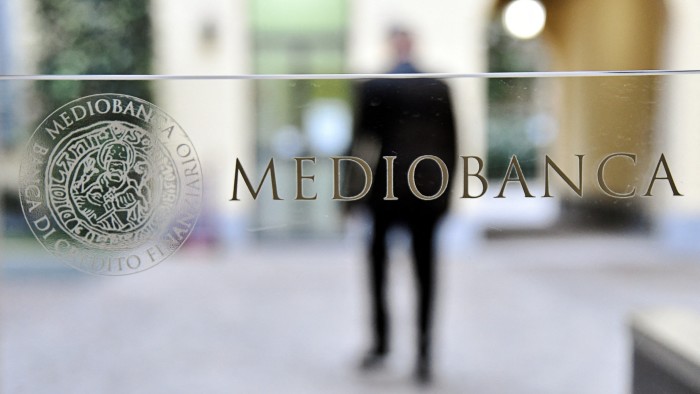Stay informed with free updates
Simply sign up to the European banks myFT Digest — delivered directly to your inbox.
Italian lender Mediobanca has reported two of its top shareholders to the European Central Bank over concerns that they are poised to gain control of three of the country’s top financial institutions without regulatory approval, according to people familiar with the matter.
In a presentation to the watchdog this month, the Milanese bank outlined how the billionaire Del Vecchio family’s investment company Delfin and construction tycoon Francesco Gaetano Caltagirone could together gain control in effect of Mediobanca, Monte dei Paschi di Siena and insurer Generali: three of Italy’s most prestigious financial institutions.
Delfin and Caltagirone are two of the top investors in each of the companies, having built up individual stakes of between 5 and 20 per cent. They have each clashed over strategy with the chief executives of Mediobanca and Generali — but have so far been unsuccessful in their attempts to unseat them.
However a hostile bid by state-backed MPS for its larger rival Mediobanca has raised the stakes because of a web of crossholdings that could amplify the investors’ sway at each of the companies if the bid succeeds.
Because of Mediobanca’s 13 per cent stake in Generali, the transaction could hand the duo influence over a combined 29 per cent of the insurer’s shares, despite only holding 16 per cent directly.
In its presentation, Mediobanca voiced governance concerns about the outsized influence the investors could gain from the chain of linked investments, the people familiar with its contents said.
At the heart of the issue is whether Delfin and Caltagirone may be circumventing rules that require them to notify regulators if they are “acting in concert”, with their stakes then aggregated for regulatory purposes.
Under ECB rules, investors who are acting in concert have to notify the central bank if they are seeking to increase their ownership of a credit institution above certain thresholds. If they fail to disclose that they are working together, they can have their voting rights frozen.
People close to Delfin and Caltagirone have denied that they are acting in a co-ordinated way. One of the people said that at a time of “multiple hostile takeovers regulators are flooded with complaints . . . and so far the regulators have not acted on these which they treat as something that is to be expected”.
The clash between Delfin, Caltagirone and the financial institutions is due to come to a head next month when Generali’s 13-member board is up for re-election.
As Generali’s largest shareholder, Mediobanca proposes the so-called majority slate of directors. But Caltagirone is presenting a minority slate that could, under Generali’s bylaws, secure an equal number of board seats if a third slate presented by funds association Assogestioni also secures a seat.
Ahead of the meeting, Generali has raised concerns with Italian insurance regulator Ivass and financial watchdog Consob that Delfin and Caltagirone are acting in concert, according to people familiar with the matter.
However, Consob has usually required a high level of proof to conclude that investors are acting in concert, such as evidence of hidden written agreements between shareholders.
ECB approval for MPS’s takeover bid is still pending, as the watchdog completes its prudential assessment of the acquisition and the private investors’ holdings.
Mediobanca, Generali, Delfin, Caltagirone, the ECB, Consob and Ivass declined to comment.




